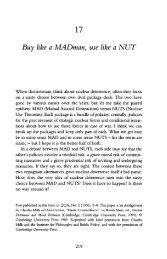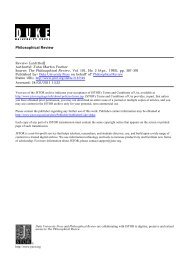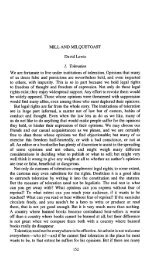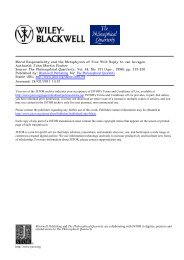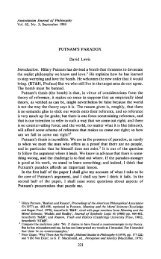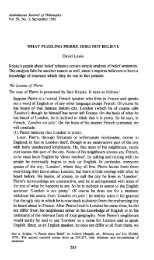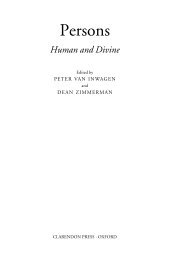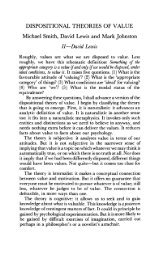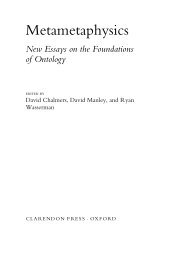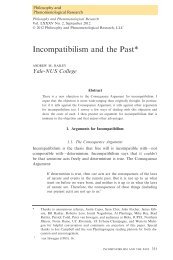Tooley and Evil - Andrew M. Bailey
Tooley and Evil - Andrew M. Bailey
Tooley and Evil - Andrew M. Bailey
- No tags were found...
You also want an ePaper? Increase the reach of your titles
YUMPU automatically turns print PDFs into web optimized ePapers that Google loves.
Downloaded by [University of Notre Dame] at 11:51 14 April 201272 <strong>Tooley</strong> <strong>and</strong> <strong>Evil</strong>: ,4 ReplyMisinterpretations' <strong>Tooley</strong> gives two reasons; in the first place, he thinks, 'theargument from evil is best understood as a probabilistic argument' (mymisemphasis), <strong>and</strong> in the second place, he claims, those philosophers I cite asendorsing the incompatibility thesis didn't in fact mean to endorse it (mymisinterpretation). Now I ascribe the incompatibility thesis to threecontemporary philosophers: Henry Aiken, J. L. Mackie, <strong>and</strong> H. J. McCloskey.According to <strong>Tooley</strong>, 'It may be that Aiken was committed to theincompatibility theses' (p. 361); Mackie <strong>and</strong> McCloskey, he thinks, were notWell, suppose we take a look at what Mackie <strong>and</strong> McCloskey say. Here iswhat Mackie says in the piece under discussion:I think, however, that a more telling criticism can be made by way of thetraditional problem of evil. Here it can be shown, not that religious beliefslack rational support, but that they are positively irrational, that the severalparts of the essential theological doctrine are inconsistent with one anotherso that the theologian can maintain his position only by a much moreextreme rejection of reason than in the former case. He must now beprepared to believe, not merely what cannot be proved, but what can bedisproved from other beliefs he holds. 5He goes on to sayIn its simplist form the problem is this: God is omnipotent; God is whollygood; <strong>and</strong> yet evil exists. There seems to be some contradiction betweenthese three propositions, so that if any two of them were true, the thirdwould be false. But at the same time all three are essential parts of mosttheological positions: the theologian, it seems at once must adhere <strong>and</strong>cannot consistently adhere to all three ....However the contradition does not arise immediately: to show it we needsome additional premisses, or perhaps some quasi-logical rules connectingthe terms 'good,' 'evil,' <strong>and</strong> 'omnipotent.' These additional principles are thatgood is opposed to evil, in such a way that a good thing always eliminates evilas far as it can, <strong>and</strong> that there are no limits to what an omnipotent thing c<strong>and</strong>o. From these it follows that a good omnipotent thing eliminates evilcompletely, <strong>and</strong> then the propositions that a good omnipotent thing exists,<strong>and</strong> that evil exists, are incompatible. (p. 201)On the basis of this passage I ascribe to Mackie the view that(1) God exists <strong>and</strong> is omnipotent, omniscient <strong>and</strong> wholly goodis incompatible or inconsistent with(2) There is evil.According to <strong>Tooley</strong>, however, Mackie did not mean, in these passages, toclaim that there is an incompatibility here; he carelessly misspoke himself.These passages, says <strong>Tooley</strong>, 'must be viewed as somewhat careless statementsof the positions being defended'. (p. 362) Again, it is hard to take <strong>Tooley</strong><strong>Evil</strong> <strong>and</strong> Omnipotence, Mind, 1955, p. 200.




